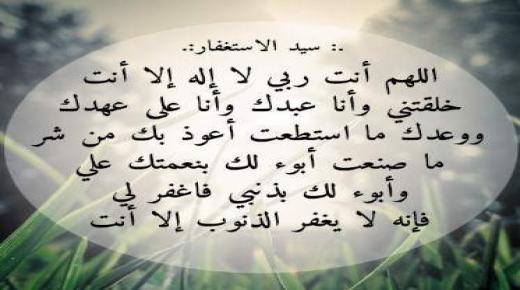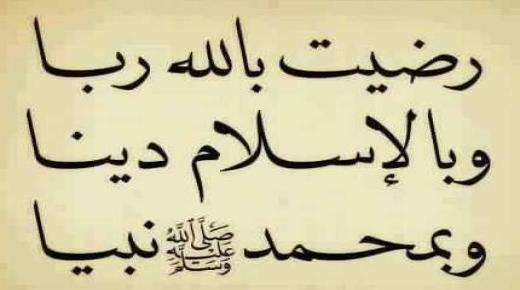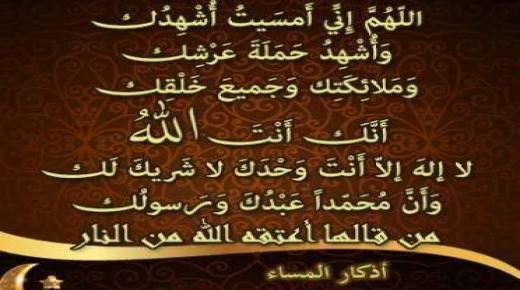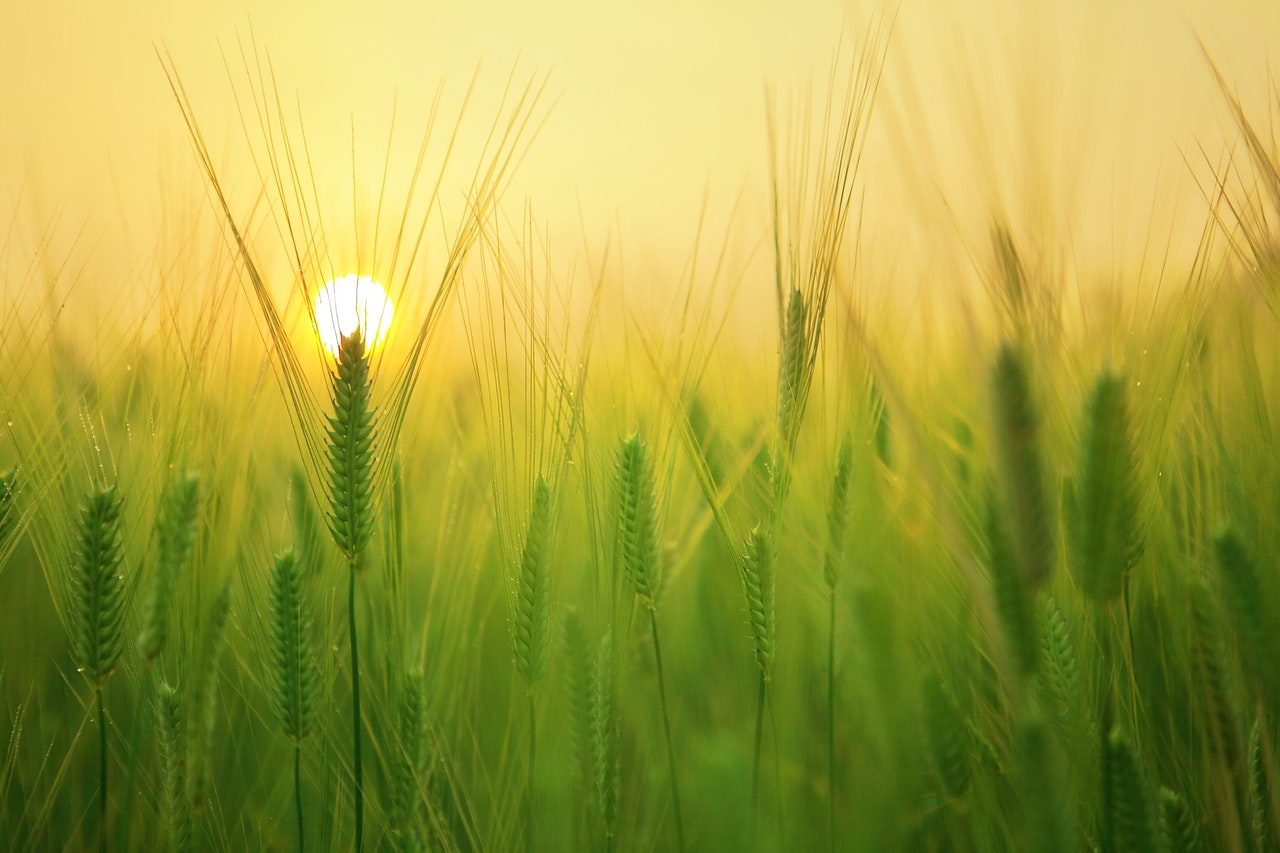
ذِكر الله من أعظم العبادات أجرًا ولصاحبه أقرب مكانة من الله (عز وجل)، فقد قال (سبحانه) في كتابه الكريم: (اتْلُ مَا أُوحِيَ إِلَيْكَ مِنَ الْكِتَابِ وَأَقِمِ الصَّلَاةَ إِنَّ الصَّلَاةَ تَنْهَى عَنِ الْفَحْشَاءِ وَالْمُنْكَرِ وَلَذِكْرُ اللَّهِ أَكْبَرُ وَاللَّهُ يَعْلَمُ مَا تَصْنَعُونَ) العنكبوت/ 45, and it was quoted from Abu Darda’ and Salman (may God be pleased with them) as saying, “The remembrance of God (the Most High) is better than everything else.” Ibn Taymiyyah, may God have mercy on him, said:
“فَإِنَّ الصَّلَاةَ فِيهَا دَفْعٌ لِلْمَكْرُوهِ وَهُوَ الْفَحْشَاءُ وَالْمُنْكَرُ، وَفِيهَا تَحْصِيلُ الْمَحْبُوبِ وَهُوَ ذِكْرُ اللَّهِ، وَحُصُولُ هَذَا الْمَحْبُوبِ أَكْبَرُ مِنْ دَفْعِ الْمَكْرُوهِ، فَإِنَّ ذِكْرَ اللَّهِ عِبَادَةٌ لِلَّهِ، وَعِبَادَةُ الْقَلْبِ لِلَّهِ مَقْصُودَةٌ لِذَاتِهَا، وَأَمَّا انْدِفَاعُ الشَّرِّ عَنْهُ فَهُوَ مَقْصُودٌ لِغَيْرِهِ عَلَى سَبِيلِ التَّبَعِ “، مجموع Fatwas (10/188).
Correct morning remembrances written in full

1- تبدأ أذكار الصباح بعد الاستعاذة من الشيطان الرجيم بقراءة أية الكرسي أَعُوذُ بِاللهِ مِنْ الشَّيْطَانِ الرَّجِيمِ “اللّهُ لاَ إِلَـهَ إِلاَّ هُوَ الْحَيُّ الْقَيُّومُ لاَ تَأْخُذُهُ سِنَةٌ وَلاَ نَوْمٌ لَّهُ مَا فِي السَّمَاوَاتِ وَمَا فِي الأَرْضِ مَن ذَا الَّذِي يَشْفَعُ عِنْدَهُ إِلاَّ بِإِذْنِهِ يَعْلَمُ مَا بَيْنَ أَيْدِيهِمْ وَمَا behind them, and they encompass nothing of His knowledge except for what He wills. His throne extends over the heavens and the earth, and He does not tire of preserving them, and He is the Mighty, the Mighty. [Ayat Al-Kursi - Al-Baqara 255].
The Ayat al-Kursi is recognized by Satan himself, for he said to Abu Hurairah (may God be pleased with him): “Whoever says it in the morning will be hired by us until evening.” And the Messenger of God confirmed his words by saying: “He told you the truth and he is a liar.”
2- Recite Al-Ikhlas and Al-Mu’awwidhatayn three times, then say:
In The Name of Allah Most Gracious Most Merciful
“Say: He is God, one * God, the Eternal, the Eternal, He begets not, nor is He begotten, and there is none equal to Him.”
“Say: I seek refuge in the Lord of the daybreak * from the evil of what He created * and from the evil of the dark when it approaches * and from the evil of the blowers in knots * and from the evil of the envious when it comes.”
Say, “I seek refuge in the Lord of the people * the King of the people * the God of the people * from the evil of the whisperer of the people * who whispers into the breasts of the people * from the people and Paradise.”
Reciting sincerity and the two exalted prayers in the morning will suffice you from everything. Abdullah bin Khubayb (may God be pleased with him) said that the Prophet (peace and blessings of God be upon him) said to him: (Say: “Say: He is God, one,” and the two exorcisms, when evening and morning three times, are sufficient for you. Everything.” Narrated by al-Tirmidhi, who said it is a good and saheeh hadeeth, that is, they will stop what worries you and what makes you sad.
And I differ, do you read every surah three times, or do you read Al-Ikhlas once, then Al-Falaq once, then Al-Nas once, then it is repeated twice?
The Messenger of God (may God bless him and grant him peace) did not specify the preference of one over the other, but Abu Hurairah (may God be pleased with him) was asked about how he mentioned them. He said: He says: “Glory be to God, praise be to God, and God is great until there are thirty-three of them all.”
3- We say, “We praise and praise the king of God and praise be to God, there is no god but God alone, and I have no partner to Him, He has the right and he has praise, and he is on everything that is capable of this and the evil that follows it, my Lord, I seek refuge in You from laziness and bad old age, my Lord, I seek refuge in You from the punishment in the Fire and the punishment in the grave” once.
4- “Oh God, you are my Lord, there is no god but You. Your favor is upon me and I acknowledge my sin, so forgive me, for no one forgives sins except You.
Whoever says it with certainty in the morning and dies on that day will enter Paradise. The hadith was narrated by Al-Bukhari, who is the master of seeking forgiveness
5- “I am satisfied with God as my Lord, with Islam as my religion, and with Muhammad (may God bless him and grant him peace) as my Prophet.”
Three times, and its reward is “Whoever says it in the morning, it is a right for God to be pleased with him on the Day of Resurrection.” And on the authority of Abu Saeed Al-Khudri (may God be pleased with him) that the Prophet (peace and blessings of God be upon him) said: (Whoever said: I am satisfied with God as my Lord, and with Islam as my religion, and with Muhammad a messenger, and Paradise became obligatory for him.” Narrated by Abu Dawood, Al-Nisa’i and Al-Hakim.
6- “Oh God, I am witnessing you in the morning, and the bearers of your throne, your angels, and all of your creation, that you are God, there is no god but You, for you, and that Muhammad is your servant and your messenger.” Whoever said it, God will free him from Hell.
7- “Oh God, whatever blessing has become of me or of one of Your creation, it is from You alone who has no partner, so to You is all praise and to You is gratitude.”
8- “Allah suffices me, there is no god but He, in Him I put my trust, and He is the Lord of the Great Throne” seven times.
Whoever says it, God will suffice him for what matters to him in this world and the Hereafter,” seven times
9- “In the name of God, with whose name nothing on earth or in the heavens harms, and He is the All-Hearing, the All-Knowing.” Whoever says it, nothing from God will harm him, three times.
10- “Oh God, with you we have become, and with you we have become, and with you we live, and with you we die, and to you the resurrection,” once.
11- “We are on the authority of Islam, and on the word of the sane, and on the debt of our Prophet Muhammad (may God bless him and grant him peace), and on the religion of our father, the one who is a good thing.”
12 - “Glory be to God and His praise is the number of His creation, the satisfaction of Himself, the weight of His Throne, and the ink of His words” three times.
13- “O Allah, heal my body, O Allah, heal my hearing, O Allah, protect my sight, there is no god but You,” three times.
14- “O Allah, I seek refuge in You from disbelief and poverty, and I seek refuge in You from the torment of the grave, there is no god but You” three times.
15- ” اللّهُـمَّ إِنِّـي أسْـأَلُـكَ العَـفْوَ وَالعـافِـيةَ في الدُّنْـيا وَالآخِـرَة، اللّهُـمَّ إِنِّـي أسْـأَلُـكَ العَـفْوَ وَالعـافِـيةَ في ديني وَدُنْـيايَ وَأهْـلي وَمالـي، اللّهُـمَّ اسْتُـرْ عـوْراتي وَآمِـنْ رَوْعاتـي، اللّهُـمَّ احْفَظْـني مِن بَـينِ يَدَيَّ وَمِن خَلْفـي وَعَن يَمـيني وَعَن شِمـالي، وَمِن فَوْقـي، وَأَعـوذُ بِعَظَمَـتِكَ أَن أُغْـتالَ مِن تَحْتـي " Once.
16- “Oh, the Living, the Sustaining, by your mercy, I seek help, fix all my affairs for me, and do not leave me to myself for the blink of an eye,” three times.
17- “We have become and the kingdom belongs to God, Lord of the worlds. Oh God, I ask you for the good of this day. I seek refuge in You from the evil of what is in it and the evil of what comes after it” once.
18- “O God, Knower of the unseen and the seen, Originator of the heavens and the earth, Lord of all things and their Sovereign. I bear witness that there is no god but You. I seek refuge in You from evil and evil.” And if I commit evil against myself or pay it to a Muslim” once.
19- “I seek refuge in the perfect words of God from the evil of what He has created” three times.
20- “Oh God, bless and bless our Prophet Muhammad” ten times.
And let us remember, “Whoever prays ten times in the morning and in the evening, my intercession on the Day of Resurrection will meet him.”
21- “O Allah, we seek refuge in You from associating anything we know with You, and we ask Your forgiveness for that which we do not know” three times.
22- “Oh God, I seek refuge in you from the god and the sadness, and I seek refuge in you from the miracle and the laziness, and I seek refuge in you from the coward and the slander, and I seek refuge in you.
23- “I ask forgiveness from God the Great, who there is no god but He, the Ever-Living, the Ever-Sustaining, and I repent to Him” three times.
24- “O Lord, praise be to You as it should be for the majesty of Your countenance and the greatness of Your authority” three times.
25- “Oh God, I ask you for useful knowledge, good sustenance, and acceptable deeds,” once.
26- “اللَّهُمَّ أَنْتَ رَبِّي لا إِلَهَ إِلا أَنْتَ، عَلَيْكَ تَوَكَّلْتُ، وَأَنْتَ رَبُّ الْعَرْشِ الْعَظِيمِ، مَا شَاءَ اللَّهُ كَانَ، وَمَا لَمْ يَشَأْ لَمْ يَكُنْ، وَلا حَوْلَ وَلا قُوَّةَ إِلا بِاللَّهِ الْعَلِيِّ الْعَظِيمِ، أَعْلَمُ أَنَّ اللَّهَ عَلَى كُلِّ شَيْءٍ قَدِيرٌ، وَأَنَّ اللَّهَ قَدْ I take full knowledge of everything.
27- “There is no god but Allah, He alone has no partner, His is the kingdom and His is the praise, and He has power over all things” a hundred times, and its reward is “He has the equivalent of freeing ten slaves, a hundred good deeds are recorded for him, and a hundred bad deeds are erased from him, and he has protection.”
28- “Glory be to God and praise be to Him,” one hundred times, and the reward is “His sins are erased, even if they are like the foam of the sea.” No one will come on the Day of Resurrection with something better than what he brought, except someone who said the same as what he said or added to it.”
29- “I ask forgiveness from God and repent to Him” a hundred times, and its reward is “a hundred good deeds will be recorded for him, and a hundred bad deeds will be erased from him, and it will be a protection for him from Satan until evening.”
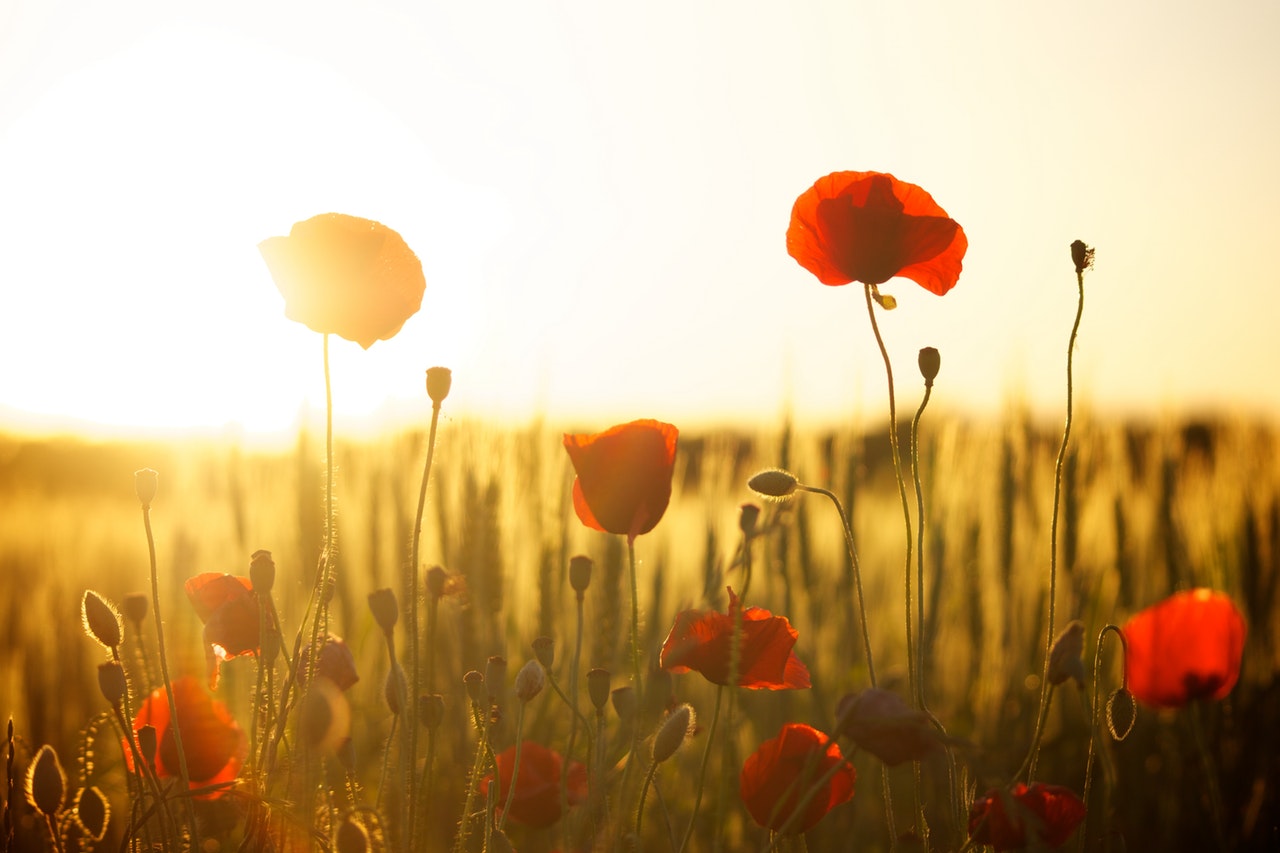
Morning remembrances for children
Parents or teachers at the kindergarten stage and in primary schools must accustom the children to the morning remembrances, before they leave the house or before the start of the school day so that they become accustomed to saying the morning remembrance throughout their lives. The dhikr is alive in their souls so that they grow up on it and live on it for the rest of their lives, and as the poet said:
And the young men among us *** grow up according to what his father used to do.
And taking into account the memory of the child, the verses that are easy to memorize should be chosen, so they cannot be asked to remember the verse of the Kursi, so they should start with sincerity and remembrance.
“I am satisfied with God as my Lord, with Islam as my religion, and with Muhammed (may God bless him and grant him peace) as my Prophet.”
“Oh God, we have become with you, and with you we have become, and with you we live, and with you we die, and to you is the resurrection.”
“Glory be to God and His praise is the number of His creation, the contentment of Himself, the weight of His Throne, and the ink of His words.”
“O God, heal my body, O God, heal my hearing, O God, heal my sight, there is no god but You.
“O Allah, I seek refuge in You from disbelief and poverty, and I seek refuge in You from the torment of the grave, there is no god but You.”
“I seek refuge in the perfect words of God from the evil of what He has created.”
“O Allah, bless and bless our Prophet Muhammad.”
“I ask forgiveness from God the Great, who there is no god but He, the Ever-Living, the Ever-Living, and I repent to Him.”
"Lord, thank you also should Jalal your face and your power is great".
"O Allah, I ask You for beneficial knowledge, and they had a good, and pursuant receptive"
“Glory be to God and His praise”
"God's forgiveness and repent to Him "
With such remembrances that are light on the tongue and heavy on the balance beloved to the Most Merciful, it can be the beginning of getting them used to the morning remembrances, so their tongues memorize them and engrave them on the pages of their hearts.
It is also taken into account that the father, the mother, or the female teacher do not start with all of them, and start with one dhikr, so that if the child memorizes it and becomes easy on his teeth, a new dhikr is added to it, and so he does not move to the third dhikr unless he is reassured that the child has memorized and mastered the dhikr that he memorized.
It warns that the moment of dhikr is a moment of great reverence, so that the child becomes accustomed to this scene in which he will have an auditory memory of repeating the dhikr and a visual memory of the scene of complete reverence, so the connection between dhikr and reverence or glorification of God (Glory be to Him) is made.
